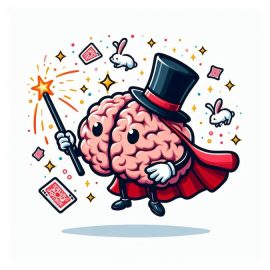

This article is an excerpt from the Shortform book guide to "The Willpower Instinct" by Kelly McGonigal. Shortform has the world's best summaries and analyses of books you should be reading.
Like this article? Sign up for a free trial here .
Have you ever noticed that the longer you have to wait for something, the less you tend to want it? How can you take advantage of delay discounting?
Delay discounting means that the longer you have to wait for something good, the less appealing it seems. This causes you to crave instant gratification rather than working towards a long-term goal. You can also turn this around and use it to your advantage. If you make that cookie harder to access, you’ll want it less.
Continue below for more on delay discounting.
How Instant Gratification Derails Us
Humans have amazingly complex brains, but all too often, we use them for rationalizing, not for making solid long-term decisions. Our brains did not evolve to respond to rewards in the far-off future; they evolved to respond to what’s good right now.
We want to sit down and write a business plan for our latest million-dollar idea, but we also want to go on a beach vacation and not open our laptops for a week. After all, we’ve been working so hard lately, and we have all those free airline points, and we are just craving those swaying palm trees and lingering sunsets.
So we tell ourselves that if we go to the beach and ponder that business plan, we’re actually getting something done. Or we tell ourselves that if we go to the beach now, we’ll have more energy to write that business plan later.
In short, we’re experts at inventing mental tricks to convince ourselves we can do tomorrow what we’re not doing today. We even give ourselves advance credit for the good behavior we will surely display in the future.
This is what economists call “delay discounting”—we’re hooked on instant gratification and not willing to wait for future gratification. The longer we have to wait for something good, the less appealing it seems.
Willpower Hack: Make Temptation Hard to Access
The good news is that there’s a tiny gap between now and the future, and you can use it to your advantage. Give your willpower a window of opportunity by making temptation a little harder to access.
For example, you won’t return home with purchases you can’t afford if you don’t carry your credit cards when you go downtown. If you have to walk downstairs and down the hall to stick your hand in the candy jar, you’ll be less likely to indulge than if you merely have to reach across your desk. And you’ll be less likely to procrastinate on writing your novel if you invest in software programs like MacFreedom, Anti-Social, or ProcrasDonate, which limit your access to email, social networks, or even the entire Internet.
Willpower Hack: Make Time Work in Your Favor
Another trick worth trying is using a time delay to your advantage. When you start thinking that your work is boring and perhaps you should switch over to your favorite Internet shopping site, set a 10-minute timer and make yourself wait. During those 10 minutes, recall your long-term goals and why they matter to you. After the time is up, if you still want to distract yourself by shopping, then fine, go ahead. When you take the “immediate” out of immediate gratification, that thing you’re craving seems less appealing.
If your willpower struggle involves procrastination, you can use the 10-minute rule in a different way. Maybe you don’t want to study for that exam or write that term paper. Tell yourself you only have to work on it for 10 minutes, and then you can quit. Once you get started, there’s a good chance you’ll just keep going long past 10 minutes.
The Stanford Marshmallow Study: Delayed Gratification
You’ve probably heard of the Stanford University study involving four-year-olds and marshmallows (the experiment ran throughout the 1960s and was published in 1972). Each kid was placed in a room with a single marshmallow and told that they could go ahead and eat it now, but if they waited 15 minutes, they could eat two marshmallows.
The kids were left alone in the room as cameras filmed their decision-making processes. Some kids invented all manner of strategies to avoid eating the marshmallow (like turning their backs on the treat or distracting themselves by singing songs or talking to themselves); others just gobbled it up immediately.
The researchers then tracked these kids’ lives for the next 40 years. Not surprisingly, the four-year-olds who were best at delaying gratification—not eating the first marshmallow—wound up having an easier time in life than the others, as determined by higher SAT scores, healthier body mass index, lower incidence of substance abuse, better social skills, and various other life measures.
(Shortform note: Over time this study has lost a bit of its luster. Some psychologists now believe that the children’s success or failure at delaying gratification had more to do with their families’ socioeconomic status than an innate propensity for self-control, and this advantage also helped them later in life. To learn more about these findings, read our summary of The Atlantic article “Why Rich Kids Are So Good at the Marshmallow Test.”)
Willpower Hack: Delay Gratification, Get a Treat
Remember the Willpower Hack from Chapter 3, “Cultivate One Small Habit”? That hack is designed to get your brain focused on paying attention to your behaviors. But the same hack can also be used to train your ability to delay gratification. Just as the four-year-olds received two marshmallows if they waited, you can promise yourself a small treat if you delay gratification.
Example: Tell yourself that if you stay focused on your work for the next two hours, you can treat yourself to XX (fill in that blank with whatever you like). And then follow through on that promise.
Keep giving yourself these little challenges over and over, and soon your brain will learn that yes, it’s worth it to wait, and yes, you are capable of exerting willpower.
Willpower Hack: Weigh That Temptation Against Your Future Self
The marshmallow study is related to what economists call future-reward discount rates—how much more is this moment’s happiness worth than future happiness? In other words, how much does the future matter to you?
When you’re trying to avoid instant gratification and stay focused on your long-term goals, you need to stop discounting the future—or at least lower the rate at which you discount it. The problem is that it’s hard to wrap our minds around the idea that the future is just as important as the present, and maybe even more so. Here’s a two-step plan:
1) Imagine that a long-term reward like your Personal Willpower Challenge is already yours. Picture your future self enjoying the benefits of having achieved your willpower goal.
2) Ask yourself if you’re willing to give up that image of happy-future-you for the fleeting impulse that’s tempting you right now.
Example: A student was addicted to Facebook. She spent so much time on the site that she missed out on study sessions and didn’t hear half of what went on in her classes. She knew it was a big problem. So she thought about her long-term goal: to become a doctor. Whenever she was tempted to waste time on Facebook, she asked herself: “Is logging on to Facebook right now worth not becoming a doctor?” When she framed the question that way, the future seemed much more real, and she could overcome her temptation.

———End of Preview———
Like what you just read? Read the rest of the world's best book summary and analysis of Kelly McGonigal's "The Willpower Instinct" at Shortform .
Here's what you'll find in our full The Willpower Instinct summary :
- That willpower isn't a character trait but rather an innate instinct that's wired into our brains
- How marketers can use "neuromarketing" to influence you to purchase more
- How you can harness your innate willpower to achieve your goals






